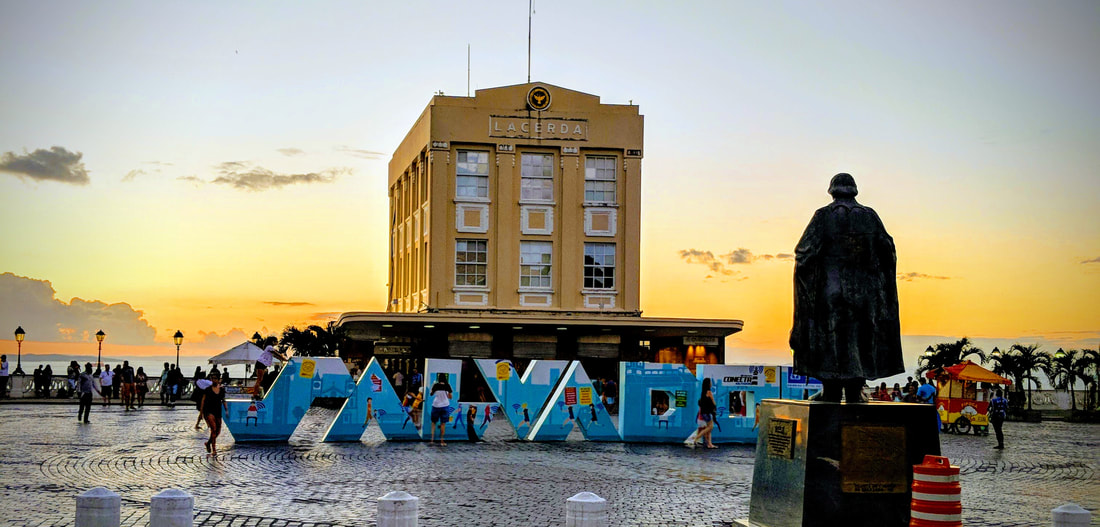|
At the start of the pandemic, I’d taken a keen interest in studying the historical development of Brazil’s political climate. Having been unable to visit Brazil in 2020, my goal was to focus on digesting as much of Brazil’s contemporary history (late 18th century to 2020) and synthesizing a common theme in terms of its political evolution. Now that I’m in Brazil, I’ve had many opportunities to do “on the ground” research, with my only limitations being time and the language barrier. At the moment, I’ve taken an interest in gathering what people thought about the military dictatorship from 1964-1985. Some of the reactions I’ve managed to elicit from people were relatively surprising, given we’re in Salvador, Bahia. Since landing on the ground in Brazil, my senses have been overwhelmed and saturated with all sorts of new things. New smells, new sights, new architecture, language, people, and so on. Everything here has potential for information and there’s so much going on it’s hard to keep track of time. I was assigned a host family based on the information provided, and with it, plenty of time to get to know them. Located just a hop-skip away from the Instituto Cervantes, the apartment resides in a middle class neighborhood/apartment complex. The area is a majority working class, although they live well. However, Bahia has a reputation for being intensely against Jair Bolsonaro, who himself used his time as a captain during the military dictatorship for his presidential platform. I was curious to find out (for those who lived through those times) what their thoughts were about the junta and whether or not they were adversely affected. Something interesting about talking to people in Bahia was their cognizance of the unique past history. Many people of color could say their ancestors were enslaved at so-and-so, although few could gander where their ancestors in Africa resided prior to being enslaved and taken to Portuguese America. Ethnic identity is a significant part of a Brazilian’s story, and it shapes how they view the world and how they define themselves as Brazilian. Dance and song were of utmost importance in the expression of Afro-Brazilians, where Brancos often reflected on what brought their ancestors over and what they did, some at the expense of other human beings. The period from 1964-1985 was another incredible chapter in Brazil’s history, with far reaching ramifications for the country and the rest of South America. I wanted to find out what people’s ethno-lingustic backgrounds were related to their experiences with the military dictatorship. The first people I asked were my host parents, who we’ll call John and Jane. John was more outspoken about his own perception of the military dictatorship, saying they were “good days.” My host mom didn’t add much on, although she did mention at one point she didn’t like candomblé. I should also note they’re both of European descent, with John being predominately Portuguese and Jane being of Spanish descent. I was keen to continue asking questions, but it seemed pacing was going to be necessary since they’d get worked up over political topics. I talked to another set of host parents, of whom were similar enough in terms of descent (host dad was European, host mother was indigenous and Afro-Brazilian), who both shared their dislike for Bolsonaro and emphasized the repressive history of the military dictatorship. Something I want to continue to study moving forward would be gender as an evolving subject in Brazil. For instance, how younger Brazilians treat women is sometimes very different than how their older counterparts expect women to be homemakers.  Nevin Vincent is a senior at CSB/SJU, where he pursues political science and history as his majors. He is originally from Palmer, Alaska. He's hoping to pursue graduate school in the future, and hopes to someday teach the history of the Turkic world. He enjoys learning about topography, linguistics, history, and sailing. He's a woodland firefighter, which gives him a unique perspective on camping. He looks forward to visiting Brazil after a two-year delay in his itinerary to Salvador due to the COVID-19 pandemic.
0 Comments
Leave a Reply. |
Archives
June 2024
Categories
All
|

 RSS Feed
RSS Feed
